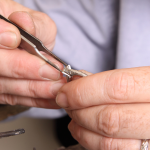 Precious metal nanoparticles have shown lots of potential for enhancing or replacing cancer treatments. For many of these treatments, getting the medicine to a very specific site within the body is key. To those ends, a team from Brown University and the University of Rhode Island have developed a proof-of-concept study that shows gold nanoparticles may improve the efficacy of radiation treatment for cancer – reducing the amount of radiation needed.
Precious metal nanoparticles have shown lots of potential for enhancing or replacing cancer treatments. For many of these treatments, getting the medicine to a very specific site within the body is key. To those ends, a team from Brown University and the University of Rhode Island have developed a proof-of-concept study that shows gold nanoparticles may improve the efficacy of radiation treatment for cancer – reducing the amount of radiation needed.
Malignant cancer cells are more acidic than the healthy cells around them. For this study, the team used acid-seeking pH low-insertion peptides (pHLIPs) to deliver gold nanoparticles as close to the cancer cells as possible. One of gold’s many unique properties is that it is a strong reflector of infrared radiation – one of the reasons why it’s so useful in aerospace applications. Once in position, the gold nanoparticles act like tiny antennas that concentrate the radiation for treatment in the area immediately around them. This means the radiation can do major damage to the nearby cancer cells without spreading to other tissues in the body.
The study found that irradiated cancer cells had a 24% lower survival rate in presence of pHLIP-delivered gold nanoparticles compared to those treated with radiation alone. As the study expands into human cases, it could mean a two-fold benefit for the patients – a more effective treatment that uses less radiation – reducing adverse effects.










